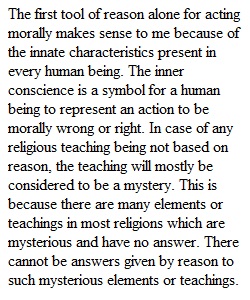


Q Kant’s ethical tools for us are mainly these: (a) to base our moral actions on reason alone, not on instinct, emotion, tradition, authority figures, etc.; (b) to act on the basis of what we determine to be our inherent duty, and not because of expected benefits/consequences; (c) to ask if we could make the maxim of our action a universal law, and only act when we say yes; and (d) to treat all persons as ends-in-themselves and never simply as a means to an end. (Reading selection 1 focuses on tools b and c, and Selection 2 focuses on all of them.) Post about at least one of these four tools. Does it make sense to you? Do you see any problems with it? Here are some possible challenges relating to each one: 1. Basing moral actions solely on reason does seem to imply that following what a religious tradition, scripture, or authority says is not necessary and may be wrong, unless they are also basing their moral teaching on pure reason. / This tool might also seem to miss the emotionality that is important to us as human beings… do you think Kant is too Stoic, as you read him? 2. Basing morally on duty, not consequences, seems very ethical in many cases, but it does entail, for Kant, you can never tell a lie. Is that realistic; is it sometime ethical to lie? / This tool also leads him to suggest (or so it seems) that when I are doing something just because I like it (e.g. I develop my artistic ability and it brings great joy to others, but I just like it) or just because it’s your habit (e.g. I don’t cheat customers not because I am thinking about my duty, but it just doesn’t cross my mind, and when I does cross my mind I stop because it’s illegal) the I am not acting with moral worth, or at least not with the highest moral worth. 3. Some problems with the third tool are like the problems just stated with a and b, but also, what’s the right way to state my maxim? For instance, Kant rules out suicide because he thinks it is evident that I cannot make my maxim “whenever I don’t want to keep living, I can take my life” because I can’t will that to be a universal law (or everyone who be killing themselves when they are depressed, when they are children, etc.). But why can’t I made a maxim that allows for medical self-suicide in limited conditions, and think that it’s rational and universalizable? 4. The fourth tool by itself it the least problematic one. It is hard to find a problem with respecting other people and yourself! Kant thinks this version of the Categorical Imperative is the same as the first one (the universal law). Do you agree?
View Related Questions